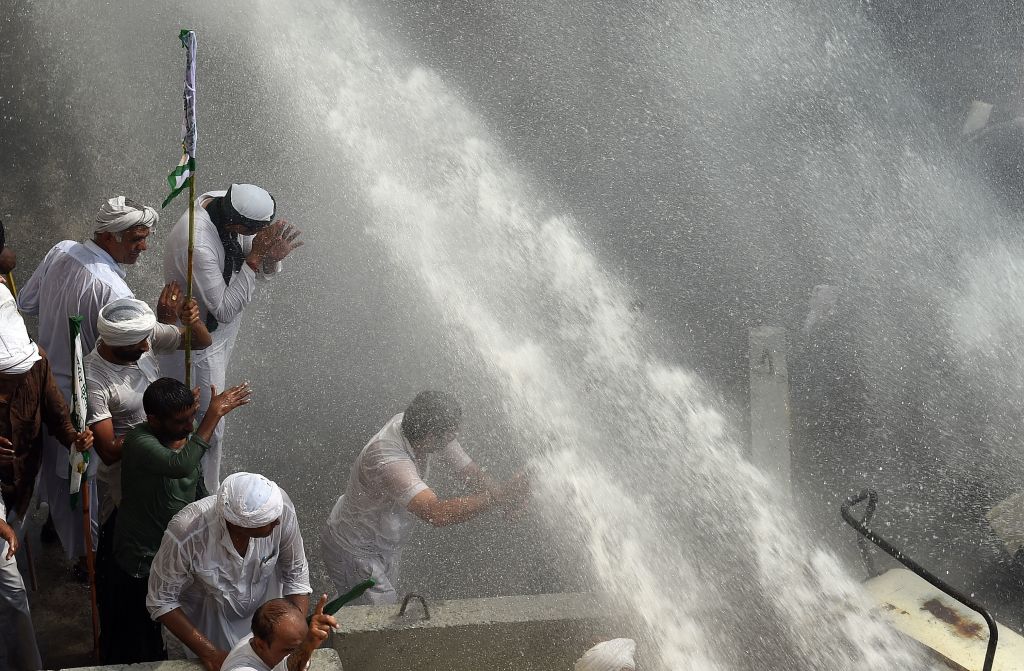Why farmers are key to the Indian elections
Rising fuel prices and fertiliser costs have sparked widespread protests from agricultural workers

A free daily email with the biggest news stories of the day – and the best features from TheWeek.com
You are now subscribed
Your newsletter sign-up was successful
Rising fuel prices and fertiliser costs are exacerbating a growing farm crisis in India that threatens to destabilise Narendra Modi’s government ahead of elections next year.
Diesel prices have risen by 26% in India this year, making it significantly more costly for the nation’s 263 million farmers to work fields and harvest and transport crops.
Alongside rising petrol costs, prices of key fertilisers such as potash and phosphate have jumped nearly 15% and 17% respectively over the past year, “as companies pass on the rise in global prices and the impact of the weak rupee to farmers”, says Reuters.
The Week
Escape your echo chamber. Get the facts behind the news, plus analysis from multiple perspectives.

Sign up for The Week's Free Newsletters
From our morning news briefing to a weekly Good News Newsletter, get the best of The Week delivered directly to your inbox.
From our morning news briefing to a weekly Good News Newsletter, get the best of The Week delivered directly to your inbox.
India is the world’s second-biggest producer of staples including rice and wheat, but “imports all its potash needs and relies on foreign supplies for nearly 90% of the phosphate it uses”, adds the news site.
“It’s a double whammy for farmers, who have to bear the brunt of lower crop prices and higher input costs,” says Devinder Sharma, an independent food and trade policy analyst.
Earlier this week, thousands of protesters under the banner of the Bhartiya Kisan Union (Indian Farmers’ Union) marched to the capital, New Delhi, from adjoining states.
Union member Dharmendra Malik told Al Jazeera that police fired “tear gas and plastic bullets at unarmed farmers”, and turned water cannons on them, in order to prevent the demonstrators from entering the city. He said about 50 people had been injured, a claim that the police have denied.
A free daily email with the biggest news stories of the day – and the best features from TheWeek.com
With elections due to be held in April or May next year, “unions representing farmers and other groups have staged protests in an effort to secure sweeteners in exchange for support at the ballot box”, the news site says.
The majority of the demonstrators at Wednesday’s march were from Uttar Pradesh, which is India’s most populous state, with more than 200 million people, and the most important electorally.
Farmer Abhimanyu Kohar condemned the police response to the protest, and said that agricultural workers will continue to demonstrate until their demands are met.
“There should be dialogue within a democracy. But this government is in a denial mode, they are unwilling to accept that there is a farm crisis. They will pay heavily in the upcoming elections for what they have done today,” he told Al Jazeera.
Official economic data supports the claims of widespread suffering among the sector’s workers. “Rural wage growth started decelerating sharply in the middle of last year, and latest data shows that they are yet to show a credible recovery,” says the Hindustan Times.
“Agriculture alone can no longer sustain families dependent on farming in the villages of Uttar Pradesh,” opposition politician Yashpal Malik told New Delhi-based newspaper National Herald.
Malik also claimed that Prime Minister Modi’s government “is forcing farmers to keep the prices low to run state subsidy schemes”.
Modi and his right-wing Bharatiya Janata Party (BJP) “routed all opposition parties in Uttar Pradesh in the last elections”, says Al Jazeera.
The PM remains personally popular, according to recent polls, “but after four years in power, support for his party has been eroded by voter concerns about jobs and the spike in fuel prices”, the site reports.
-
 Epstein files topple law CEO, roil UK government
Epstein files topple law CEO, roil UK governmentSpeed Read Peter Mandelson, Britain’s former ambassador to the US, is caught up in the scandal
-
 Iran and US prepare to meet after skirmishes
Iran and US prepare to meet after skirmishesSpeed Read The incident comes amid heightened tensions in the Middle East
-
 EU and India clinch trade pact amid US tariff war
EU and India clinch trade pact amid US tariff warSpeed Read The agreement will slash tariffs on most goods over the next decade
-
 Israel retrieves final hostage’s body from Gaza
Israel retrieves final hostage’s body from GazaSpeed Read The 24-year-old police officer was killed during the initial Hamas attack
-
 China’s Xi targets top general in growing purge
China’s Xi targets top general in growing purgeSpeed Read Zhang Youxia is being investigated over ‘grave violations’ of the law
-
 Panama and Canada are negotiating over a crucial copper mine
Panama and Canada are negotiating over a crucial copper mineIn the Spotlight Panama is set to make a final decision on the mine this summer
-
 Why Greenland’s natural resources are nearly impossible to mine
Why Greenland’s natural resources are nearly impossible to mineThe Explainer The country’s natural landscape makes the task extremely difficult
-
 Iran cuts internet as protests escalate
Iran cuts internet as protests escalateSpeed Reada Government buildings across the country have been set on fire


